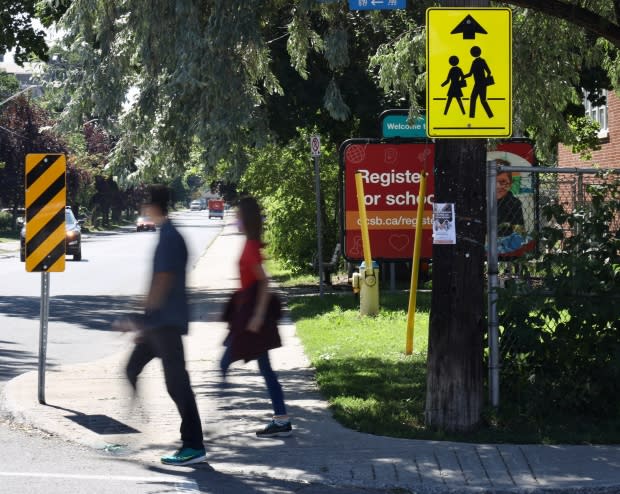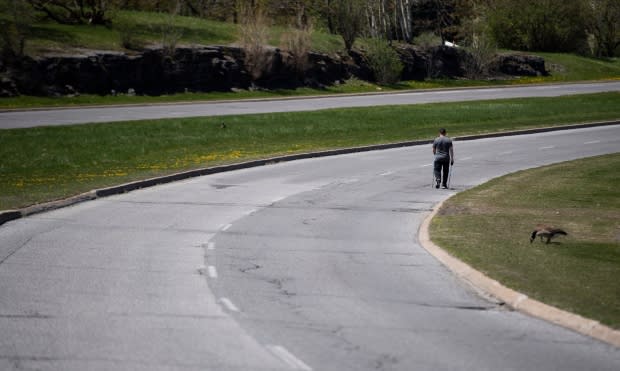What you need to know about COVID-19 in Ottawa on Tuesday, Sept. 1

Recent developments:
Homeless men will be moved from "underutilized" Jim Durrell arena.
Rue Jacques-Cartier in Gatineau is reopening to vehicles Sept. 8, earlier than expected.
What's the latest?
The city is moving a group of homeless men out of the Jim Durrell Recreation Centre and into a smaller community centre where they'll continue to be offered safe shelter during the pandemic, Ottawa's director of housing services said Tuesday.
COVID-19 has claimed another life in Ottawa, bringing the city's death toll to 267 since the pandemic began.
Ottawa Public Health (OPH)'s daily update logged eight newly confirmed cases.
Rue Jacques-Cartier along the Gatineau River will now reopen to vehicles Sept. 8, three weeks earlier than expected. It was closed in mid-June to offer more space to cyclists and pedestrians, with mixed reviews from local business owners.
Health Canada now says it is willing to consider approving home COVID-19 tests to screen for the virus, reversing its previous position.
What's the latest on schools?
The Ottawa-Carleton District School Board says in-person school will begin Sept. 8 at the earliest for high school students and Sept. 14 at the earliest for elementary students. Remote learners will not start class until Sept. 18.
This morning Camille Williams-Taylor, the education director for OCDSB, spoke with Ottawa Morning to answer the many questions parents, staff and students have about back to school.
The Ottawa Catholic School Board (OCSB) has also delayed the return to school, staggering it between Thursday and Sept. 15 depending on grade. Its starting date for online learning remains unchanged.

The Conseil des écoles catholiques du Centre-Est is delaying the start of the school year for some high school students and those who will be learning remotely until Sept. 8. Other students return Thursday.
In a letter to parents, the Upper Canada District School Board (UCDSB) said once the school year starts it "may not be possible" now for students to switch between classroom and online learning because of high demand.
The board has implemented a staggered start over three days starting Sept. 11.
In western Quebec, the French Portages-de-l'Outaouais school board starts today, meaning all five of its boards have started up classes again.
How many cases are there?
There have been 2,975 confirmed cases of COVID-19 in Ottawa since the start of the pandemic: 219 known active cases, 2,489 cases considered resolved and a total of 267 deaths related to the illness.
Overall, public health officials have reported more than 4,500 cases across eastern Ontario and western Quebec, with more than 3,800 resolved.
COVID-19 has killed 102 people in the region outside Ottawa: 52 people have died in Leeds, Grenville and Lanark counties, 33 in the Outaouais and 17 in other parts of eastern Ontario.
What's open and closed?
Ottawa is in Stage 3 of Ontario's reopening plan, which means more businesses are open including dine-in restaurants and movie theatres.
Indoor gatherings of up to 50 people and outdoor gatherings of up to 100 are now allowed in that province but attendees must follow physical distancing guidelines.
Quebec has similar reopening rules, with its cap on physically distanced gatherings in public venues now up to 250 people, allowing smaller festivals.
The Canadian Museum of Nature reopens with pandemic changes starting on Saturday.
The National Capital Commission's road changes to favour active transportation over vehicles are scheduled to end Monday, though they have been extended before.

Distancing and isolating
The novel coronavirus primarily spreads through droplets when an infected person coughs or sneezes on another person or object. People don't need to have symptoms to be contagious.
That means physical distancing measures such as working from home, meeting others outdoors as much as possible and keeping distance from anyone they don't live with or have in their circle, including when you have a mask on.
Masks are now mandatory in indoor public settings in all of eastern Ontario and Quebec, where transit officials and taxi drivers are now required to bar access to users over age 12 who refuse to wear one.
Masks are also recommended outdoors when you can't stay the proper distance from others.

Anyone who has travelled recently outside Canada must self-isolate for at least 14 days. In Ontario, that's the same period of isolation for anyone with symptoms.
Most people with a confirmed COVID-19 case in Quebec can end their self-isolation after 10 days if they have not had a fever for at least 48 hours and has had no other symptom for at least 24 hours.
Ontario's Chief Medical Officer of Health strongly urges self-isolation for people with weakened immune systems and OPH recommends people over 70 stay home as much as possible.
What are the symptoms of COVID-19?
COVID-19 can range from a cold-like illness to a severe lung infection, with common symptoms including fever, a dry cough, vomiting and the loss of taste or smell.
Less common symptoms include chills, headaches and pinkeye. Children can develop a rash.
If you have severe symptoms, call 911.
WATCH | Meet COVID-19 vaccine test subjects:
Where to get tested
In eastern Ontario:
In Ottawa any resident who feels they need a test, even if they are not showing symptoms, can be tested at one of three sites.
Inuit in Ottawa can call the Akausivik Inuit Family Health Team at 613-740-0999 for service, including testing, in Inuktitut or English on weekdays.
WATCH | A unique move-in day at U of O:
In the Eastern Ontario Health Unit area, there is a drive-thru centre in Casselman that can handle 200 tests a day and assessment centres in Hawkesbury and Winchester that don't require people to call ahead.
Others in Alexandria, Rockland and Cornwall require an appointment.
In Kingston, the Leon's Centre is hosting the city's test site. Find it at Gate 2.
Napanee's test centre is open daily for people who call for an appointment.

You can arrange a test in Bancroft, Belleville or Trenton by calling the centre and in Picton by texting or calling.
The Leeds, Grenville and Lanark unit asks you to get tested if you have a symptom or concerns about exposure.
It has a walk-in site in Brockville at the Memorial Centre and testing sites in Smiths Falls and Almonte which require an appointment.
Renfrew County residents should call their family doctor and those without access to a family doctor can call 1-844-727-6404 to register for a test or if they have health questions, COVID-19-related or not.
It's testing in five communities this week with an appointment.
WATCH | Small business rent program ends:
In western Quebec:
Outaouais residents now can get a walk-in test in Gatineau five days a week at 135 blvd. Saint-Raymond and at recurring clinics by appointment in communities such as Gracefield, Val-des-Monts and Fort-Coulonge.
They can call 1-877-644-4545 to make an appointment or if they have other questions.
First Nations:
Akwesasne has had 14 confirmed COVID-19 cases. Most are linked back to a gathering on an island with a non-resident who wasn't showing symptoms at the time.
It has a mobile COVID-19 test site available by appointment only. Anyone returning to the community on the Canadian side of the international border who's been farther than 160 kilometres away — or visited Montreal — for non-essential reasons is asked to self-isolate for 14 days.
Anyone in Tyendinaga who's interested in a test can call 613-967-3603 to talk to a nurse. Face coverings are now mandatory in its public buildings.
People in Pikwakanagan can book an appointment for a COVID-19 test by calling 613-625-2259. It lifted its state of emergency in late August.
Kitigan Zibi plans on starting to open schools and daycares next month.
WATCH | First Nations students adapt to COVID-19:
For more information


